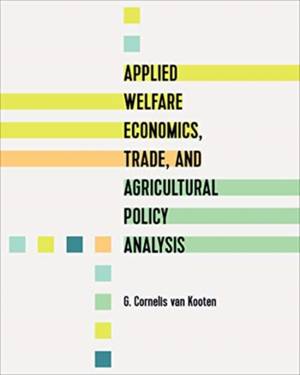
- Afhalen na 1 uur in een winkel met voorraad
- Gratis thuislevering in België vanaf € 30
- Ruim aanbod met 7 miljoen producten
- Afhalen na 1 uur in een winkel met voorraad
- Gratis thuislevering in België vanaf € 30
- Ruim aanbod met 7 miljoen producten
Applied Welfare Economics, Trade, and Agricultural Policy Analysis
G Cornelis Van KootenOmschrijving
This textbook integrates three related fields in economics, namely agricultural/forestry economics, environmental economics, and international trade, by foregrounding cost-benefit analysis as a significant policy tool.
Exploring how welfare measures can be used in the analysis of agricultural, trade, and other economic policies, Applied Welfare Economics, Trade, and Agricultural Policy Analysis fills a gap in the literature on agricultural policy analysis by explaining the economic efficiency improvements and income transfers of various agricultural policy reforms in the United States, Canada, and the European Union.
G. Cornelis van Kooten addresses methods of identifying and measuring economic surpluses (costs and benefits), the precautionary principle, identification of an appropriate discount rate, the importance of nonmarket values, and the role of agriculture in trade negotiations and climate change. Applied Welfare Economics, Trade, and Agricultural Policy Analysis draws on new research, brings attention to the existing literature, and includes review questions at the end of each chapter. The techniques developed in this text can be applied to the development and reform of agricultural policies in various regions.
Specificaties
Betrokkenen
- Auteur(s):
- Uitgeverij:
Inhoud
- Aantal bladzijden:
- 326
- Taal:
- Engels
Eigenschappen
- Productcode (EAN):
- 9781487506070
- Verschijningsdatum:
- 20/10/2021
- Uitvoering:
- Hardcover
- Formaat:
- Genaaid
- Afmetingen:
- 211 mm x 264 mm
- Gewicht:
- 839 g

Alleen bij Standaard Boekhandel
Beoordelingen
We publiceren alleen reviews die voldoen aan de voorwaarden voor reviews. Bekijk onze voorwaarden voor reviews.











